With the World Cup around the corner, who appears to be a contender, and whose stay is trending toward a three-and-out?
The four years (and four months) since the last World Cup have been challenging in football, as in life in general. The COVID-19 pandemic has meant compressed seasons and an even more hectic schedule than usual, while the emergence of the UEFA Nations League has made it very difficult for countries from outside the region to secure fixtures against European opposition. Combine the probable impact of fatigue and the fact that the November start means almost nobody has proper preparation time and it all makes assessing national teams’ form and World Cup outlooks extremely difficult.
The past two decades at the World Cup have been dominated by UEFA, with Europe providing the winners of the last four World Cups along with 13 of the 16 semifinalists in that time. The sense is that the tournament in Qatar may be more open than recent World Cups, if only because so much feels unknown or uncertain. With that caveat in mind, we assess form, ability and the draw to rank the 32 challengers.
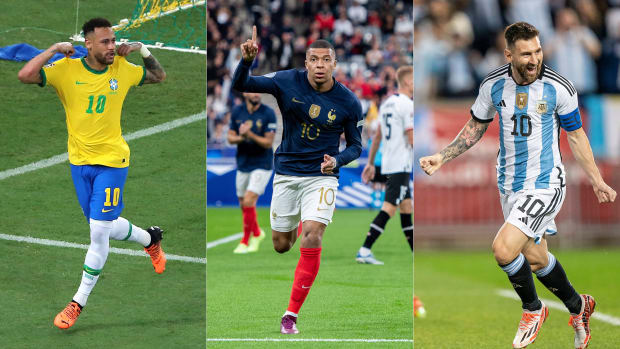
Imago Images (3)
2022 World Cup Power Rankings
1. BRAZIL
Group G opponents: Serbia, Switzerland, Cameroon
Brazil has lost only one of its last 29 games—the Copa América final to Argentina—and is playing with a rare attacking verve, with Neymar creating for a front three selected from Richarlison, Vinícius Júnior, Raphinha and Gabriel Jesus. The big doubt is whether the pairing of Casemiro and Fred at the back of midfield is enough to counteract the best, a concern heightened by the fact that Brazil has faced just one European side since losing to Belgium in the quarterfinals four years ago.
2. ARGENTINA
Group C opponents: Saudi Arabia, Mexico, Poland
If Argentina passes unbeaten through the group stage in Qatar, it will set a new world record of 38 games unbeaten. It’s debatable how significant that is, given it has faced only three European sides in that run, one of them Estonia. But the run does include the Copa América title in Brazil last year, a first senior trophy for Argentina since 1993, and a 3–0 win over Italy in the Finalissima, a meeting between reigning South American and European champions. What is clear is that the retirement of a lot of aging forwards has cleared the roster logjam, and Lionel Messi finally has a balanced forward line in which to play.
3. SPAIN
Group E opponents: Costa Rica, Germany, Japan
Spain is the only one of the top European sides to approach the World Cup in anything approaching good form, beating Portugal to top its Nations League group—although even it has won only three of its last six games. Luis Enrique’s side is capable of mesmerizing passing football, but the defeat to Switzerland in September suggested the familiar problem of turning possessions into chances and goals has not yet been resolved.
4. NETHERLANDS
Group A opponents: Senegal, Ecuador, Qatar
Louis van Gaal has recovered after treatment for prostate cancer and, at 71, he gets a third go at managing the national side. He rescued a sinking qualification campaign, and no team had a better record in the Nations League than the Dutch, with five wins and a draw from six games. The manager has retained the back three that was a feature of his Netherlands side’s progress to the semifinals in 2014, while Memphis Depay, who scored 12 goals in qualifying, has found form for his country despite struggling to produce consistently at the club level with Barcelona. Georginio Wijnaldum (broken leg) missing the World Cup is a significant loss, however.
5. GERMANY
Group E opponents: Japan, Spain, Costa Rica
This is a highly talented Germany side that qualified with nine wins out of 10 matches, but Nations League results were disappointing, with just one win from six games. There is an obvious absence at center forward, but the bigger issue may be at the back. Hansi Flick has brought a freshness after 15 years of Jogi Löw, but implementing the sort of high line he favors was a risk at the club level, let alone with the limited time available to international managers—even with goalkeeper Manuel Neuer sweeping behind it.
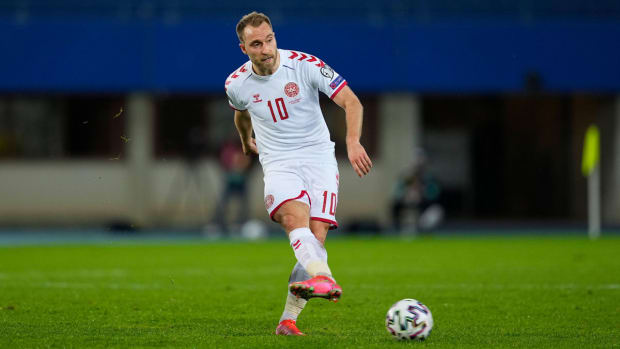
Kim Price/ZUMA Wire/Imago Images
6. DENMARK
Group D opponents: Tunisia, France, Australia
Under Kasper Hjulmand, Denmark has become a crisp, efficient side. It reached the semifinals of the Euros last summer, despite Christian Eriksen suffering a cardiac arrest against Finland, and it won four out of six Nations League games, twice beating world-champion France, whom it will meet again in the group stage. Eriksen, remarkably, has returned and is in fine form, while Tunisia and Australia should not trouble the Danes.
Watch soccer with fuboTV. Start your free trial today.
7. FRANCE
Group D opponents: Australia, Denmark, Tunisia
The world champion has a squad packed with talent, but Didier Deschamps’s side endured a disappointing Euros and finished third in its Nations League group, winning only one of six games. Kylian Mbappé’s insistence on playing alongside Karim Benzema or Olivier Giroud has reduced the tactical options, while there are a number of difficult personalities in the ranks who would probably benefit from a less abrasive coach than Deschamps. Midfield stalwarts N’Golo Kanté and Paul Pogba are among those who will miss out through injury, placing additional pressure on young talents Aurélien Tchouaméni and Eduardo Camavinga to perform.
8. CROATIA
Group F opponents: Morocco, Canada, Belgium
After reaching the final of the World Cup four years ago, the sense had been that Croatia was a fading force, particularly after a slightly tepid showing at the Euros (at least up to its extraordinary 5–3 defeat to Spain in the last 16). But Zlatko Dalić’s side topped a tough Nations League group featuring both France and Denmark and has lost just one of 11 games since the Euros. Luka Modrić, Ivan Perišić, Domagoj Vida and Andrej Kramarić perhaps have one last tournament left in them.
9. ENGLAND
Group B opponents: Iran, USA, Wales
The semifinal at the last World Cup, the final of Euro 2020: could England be, at last, edging towards success at a major tournament? Not if form in the Nations League is any gauge. Gareth Southgate’s side was relegated after failing to win any of its six games, and injuries to Kyle Walker, Reece James and Kalvin Phillips, along with Harry Maguire’s loss of form, have cooled any real optimism. There is also a very obvious over-reliance on Harry Kane for goals.
10. SWITZERLAND
Group G opponents: Cameroon, Brazil, Serbia
Vladimir Petković may have gone after seven years in charge, but his legacy goes on under Murat Yakin. Switzerland has become one of those awkward sides, easy to overlook but well organized and with just enough attacking menace, now embodied in Breel Embolo, to upset more vaunted teams. The Swiss went unbeaten through World Cup qualifying, pushing Italy into a playoff, and beat Portugal, Spain and Czech Republic in its last three Nations League fixtures.
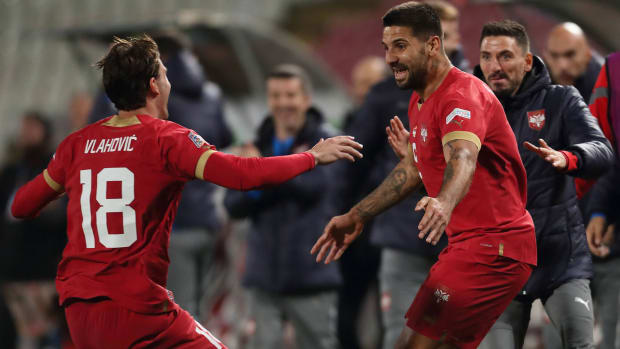
Marko Metlas/MN Press Photo/Imago Images
11. SERBIA
Group G opponents: Brazil, Cameroon, Switzerland
It’s not an unfamiliar feeling in Belgrade for the national team to go to a major tournament optimistic after a promising qualification campaign only to fall apart under the pressure of the main event, and there must be caveats, too, about a tough group, but Dragan Stojković, one of the all-time greats of Yugoslav football, has instilled in his side swagger and confidence. It finished ahead of Portugal in qualifying and earned promotion from Nations League Group B as the strike pairing of Aleksandar Mitrović and Dušan Vlahović inspired resounding victories over Sweden and Norway.
12. URUGUAY
Group H opponents: South Korea, Portugal, Ghana
Uruguay’s qualification campaign was faltering badly when the difficult decision was taken to replace Óscar Tabárez as coach after 15 years. Diego Alonso guided La Celeste to Qatar with four straight wins, but form since has been mixed. Ideally, Alonso would play Luis Suárez and Darwin Núñez as a front two, but doing so leaves Uruguay short in midfield, which has led to the intriguing if not entirely convincing expedience of Núñez playing wide on the left.
13. PORTUGAL
Group H opponents: Ghana, Uruguay, South Korea
Portugal has never been a particularly efficient qualifier, and in that regard there perhaps isn’t too much to be read into the fact it finished behind Serbia and made it to Qatar only through the playoffs. But recent form has not been good: one win out of four games at the Euros, followed by two defeats in its final three games in the Nations League. The sense is that Cristiano Ronaldo, as he has at club level, is beginning to gum up the mechanisms, and injuries to Diogo Jota and Pedro Neto don’t help.
14. SENEGAL
Group A opponents: Netherlands, Qatar, Ecuador
Aliou Cissé’s side has been building for four years now. Having been eliminated from the last World Cup on a fair-play tiebreaker against Japan, Senegal lost in the final of the 2019 Cup of Nations. But it won that competition for the first time in February and followed it up with a second successive World Cup qualification. Édouard Mendy, Kalidou Koulibaly, Idrissa Gueye and Sadio Mané represent a powerful and reliable spine, though there is obvious concern over Mané’s status after he injured his fibula playing for Bayern Munich. Indications are he’ll still go to Qatar, but his readiness and effectiveness will be monitored closely.
15. BELGIUM
Group F opponents: Canada, Morocco, Croatia
This is still Belgium. This is still the side of Kevin De Bruyne, Romelu Lukaku, Thibaut Courtois and Eden Hazard. It is still capable of devastating attacking football, as it showed in beating Poland 6–1 in June. But it is also still the Belgium of Toby Alderweireld and Jan Vertonghen, and having a pair of center backs with a combined age of 68 is rarely a recipe for success. The golden generation has grown old, and the next generation seems nowhere near the same quality.
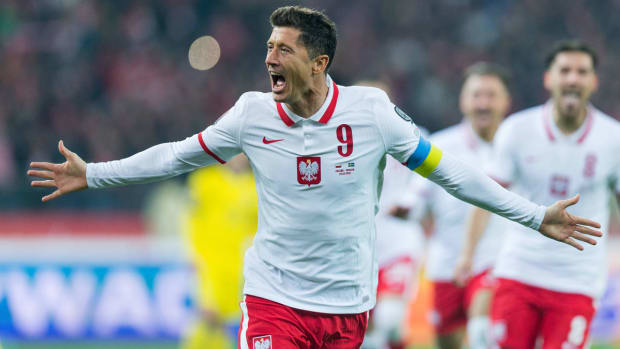
Foto Olimpik/NurPhoto/Imago Images
16. POLAND
Group C opponents: Mexico, Saudi Arabia, Argentina
Poland finished behind England in UEFA qualifying after which Paulo Sousa quit as coach to take up a post with Flamengo. He was replaced by Czesław Michniewicz, who oversaw a playoff win over Sweden (after Russia had been expelled) to secure Poland’s place in Qatar. Nations League results have been mixed: There were two wins over Wales but also a 6–1 humbling against Belgium. Robert Lewandowski remains in fine form despite Barcelona’s worries, and the group is relatively kind, though the opening match vs. Mexico carries with it significant ramifications.
17. WALES
Group B opponents: USA, Iran, England
There is a special atmosphere around the Wales squad these days as the golden age that began with qualification for Euro 2016 enters a second phase that has brought a first World Cup qualification since 1958. The concern is that the remarkable atmosphere that has been such a feature of Wales games recently, with the folk singer Dafydd Iwan belting out “Yma o Hyd” (Still Here), his anti–Margaret Thatcher cry of defiance, cannot be reproduced in Qatar, with many fans choosing to congregate in Tenerife instead. Gareth Bale, despite his fitness concerns, remains the star.
18. ECUADOR
Group A opponents: Qatar, Netherlands, Senegal
Ecuador finished fourth in CONMEBOL World Cup qualifying, the protracted nature of which means that no side ever qualifies by fluke. Gustavo Alfaro’s team is defensively solid and has not conceded in any of its last five games, but goals may be a problem, as was apparent in a pair of 0–0 draws in September, against Saudi Arabia and Japan. A lack of experience against European opposition may be an issue, but the draw could have been much tougher.
19. CANADA
Group F opponents: Belgium, Croatia, Morocco
Canada topped the final round of Concacaf World Cup qualifying, losing just two of its 14 games and going unbeaten against Mexico and the U.S., and it has in Alphonso Davies probably the highest-profile star in its history. But recent results have been less impressive. There was a Nations League defeat to Honduras and a 2–0 friendly reverse against Uruguay in Bratislava that highlighted the lack of experience against sides from outside Concacaf. The group, though, for Canada’s first World Cup appearance since 1986, is relatively kind.
20. MEXICO
Group C opponents: Poland, Argentina, Saudi Arabia
Usually, you know where you stand with Mexico. Since being banned in 1990, it has always qualified for the World Cup, always gotten through the group stage and always gone out in the last 16. Perhaps it can repeat that in Qatar—it looks like a straight shootout with Poland for second in the group—but recent form under Gerardo Martino has not been impressive, with just three wins in the last eight games. A win over Peru in September offered some hope, but that was followed by the squandering of a two-goal lead against Colombia. Most recently, Mexico routed Iraq in an off-calendar friendly this week.
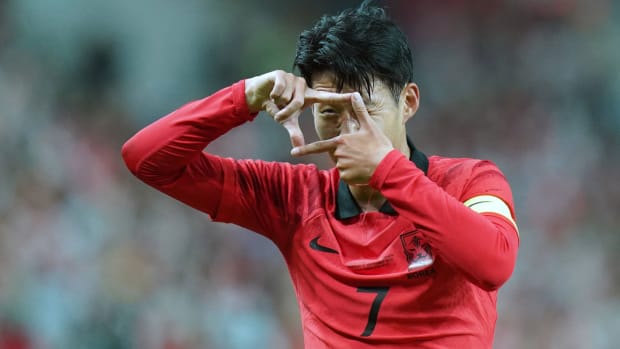
Seokyong Lee/Penta Press/Imago Images
21. SOUTH KOREA
Group H opponents: Uruguay, Ghana, Portugal
South Korea qualified comfortably enough, winning seven out of 10 third-phase games and conceding just three goals as it did so. That Paulo Bento’s side scored just 13 goals in that run, though, is a concern, as is form since qualifying, with wins over Chile and Egypt rubbing alongside a 5–1 hammering at the hands of Brazil and unconvincing friendly performances against Costa Rica and Cameroon. The group, though, is far from intimidating, and Son Heung-min’s confirmation that he’ll be going to Qatar despite a suffering facial fracture while playing for Tottenham is a relief.
22. MOROCCO
Group F opponents: Croatia, Belgium, Canada
Vahid Halilhodžić, for the third time, has been fired as coach shortly before a World Cup for which he had qualified a nation, but the general feeling in Morocco has been of relief, not least because his departure has paved the way for the return of Hakim Ziyech to the squad. Walid Regragui has taken charge and had a promising start in the September friendlies with a win over Chile and a draw against Paraguay.
23. UNITED STATES
Group B opponents: Wales, England, Iran
The good news for Gregg Berhalter’s side is that the group, although the hardest by world ranking when the draw was made, contains no demons: England, the seeded team, is faltering and has won neither previous World Cup match against the U.S. (1950, 2010). The bad news is that, despite the presence in the squad of a number of players who are regulars at top European sides, there is little sign of balance or consistency: defeat to Japan and the draw against Saudi Arabia in September offered little reason for optimism.
24. IRAN
Group B opponents: England, Wales, USA
Carlos Queiroz is back, for which the world can raise an almighty yawn. Iran wasn’t exactly the most expensive side under Dragan Skočić, who won 15 of 18 games in charge and oversaw a comfortable World Cup qualification before being ousted for the return of the increasingly dour Queiroz. A win over Uruguay and a draw against Senegal in friendlies in September were a promising start, but more significant was probably the team’s support for protests at home against the repression of women. Sardar Azmoun’s availability after a calf injury suffered last month could prove decisive.
25. QATAR
Group A opponents: Ecuador, Senegal, Netherlands
It’s hard to know quite what to make of Qatar, which might suffer the fate of South Africa and be eliminated in the group stage of its own World Cup. It may be the reigning Asian champion, but recent form has been dreadful, with defeats in September to Canada and a Croatia U-23 side. Last year there was a run of eight games against non-Asian opposition; none of them won. Host nations often overperform, but the group is tough.
26. JAPAN
Group E opponents: Germany, Costa Rica, Spain
Japan qualified comfortably enough, overcoming early defeats to Oman and Saudi Arabia to finish seven points clear of third-placed Australia in the group, but its recent performances in a 2–0 win over the U.S. and a goalless draw with Ecuador should offer real encouragement to Hajime Moriyasu’s side. They’re a little lacking in creative spark, but the biggest issue is the draw: The presence of Spain and Germany in the group makes progress to the last 16 extremely unlikely.
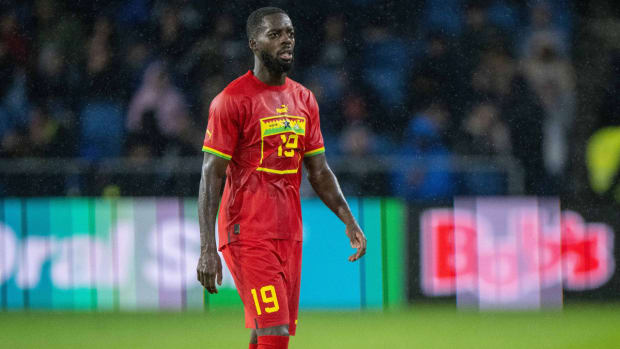
Sebastian Frej/Imago Images
27. GHANA
Group H opponents: Portugal, South Korea, Uruguay
Ghana had a terrible Cup of Nations earlier this year, losing to Morocco and Comoros in being eliminated bottom of the first-round group, but there have been improvements since. Milovan Rajevac himself reappointed only weeks before the tournament, has been replaced as coach by Otto Addo, with Chris Hughton, the former Brighton manager, as technical director. They masterminded an away-goals win over Nigeria in the qualifying playoff, but since then both Tariq Lamptey and Iñaki Williams have been persuaded to represent the Black Stars.
28. AUSTRALIA
Group D opponents: France, Tunisia, Denmark
It took an Asian playoff against the UAE and then an intercontinental playoff against Peru to get Australia to the World Cup, so at least Graham Arnold’s side is case-hardened. There has, though, been very little consistency of selection, and this is not a squad with much experience of football at the very highest level. Back-to-back wins over New Zealand in September have raised hopes to an extent, and Jason Cummings impressed on debut, but this is a tough group.
29. TUNISIA
Group D opponents: Denmark, Australia, France
Hope had begun to kindle in Tunisia after a disappointing Cup of Nations in which it lost to Mali, Gambia and Burkina Faso. Jalel Kadri’s side had gone seven games unbeaten, a run that included victories over Japan and Chile. But a 5–1 friendly defeat to Brazil at the end of September has perhaps reset expectations for a side very reliant on its defense to cover for a less-than-imaginative forward line.
30. CAMEROON
Group G opponents: Switzerland, Serbia, Brazil
Toni Conceição was removed as coach after a Cup of Nations in which Cameroon, on home soil, reached the semifinal but seemed very reliant on the goals of Vincent Aboubakar. Former defender Rigobert Song, the only man other than Zinedine Zidane to be sent off twice at a World Cup, has taken over, but, although he led Cameroon to an away-goals win over Algeria in the qualifying playoff, friendly defeats to Uzbekistan and South Korea in September do not bode well.
31. COSTA RICA
Group E opponents: Spain, Japan, Germany
Good news comes in the form of Jewison Bennette, the prodigiously talented 18-year-old who features for Sunderland. He set up the only goal in the qualifying playoff win over New Zealand and then got his first international goals in a 2–2 friendly draw away to South Korea in September. That came as part of a run of one defeat in 12 games. The bad news is just about everything else, most notably an unconvincing qualifying campaign, an aging core, a lack of experience against non-Concacaf sides and a brutally difficult group.
32. SAUDI ARABIA
Group C opponents: Argentina, Poland, Mexico
Saudi Arabia qualified for the World Cup comfortably enough, with just one defeat in 10 games. It scored just 12 goals in those matches, though, which suggests the major failing under manager Hervé Renard. Form since qualification was secured has been dismal, with just one win in six games and two goals scored (albeit only three were conceded). Its group offers little relief.
More World Cup Coverage: